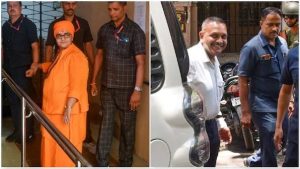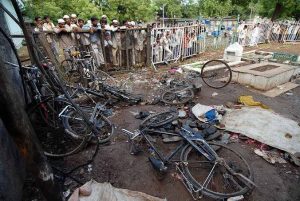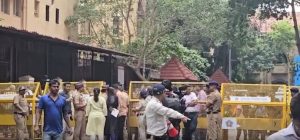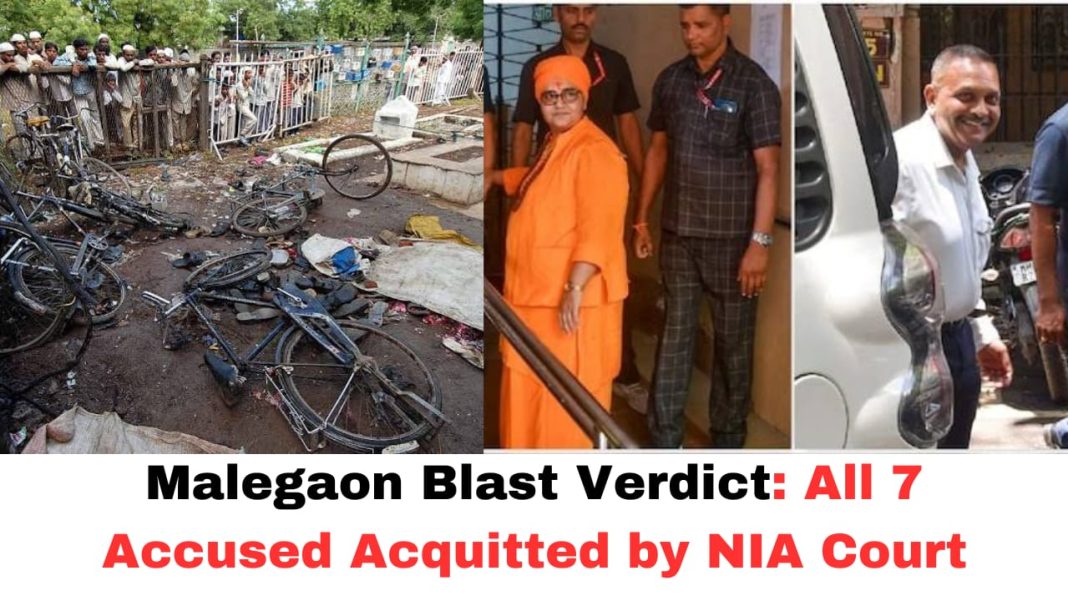Digital News Guru Mumbai Desk:
NIA Court Acquits All in 2008 Malegaon Blast Case
A special National Investigation Agency (NIA) court in Mumbai acquitted all seven accused in the September 29, 2008 Malegaon bomb blast case, including former BJP MP Pragya Singh Thakur and Lt Col Prasad Shrikant Purohit. The court concluded after nearly 17 years of legal proceedings that the prosecution failed to present cogent and reliable evidence to secure convictions.
The blast near Bhikku Chowk during Ramzan killed six people and injured over 100, plunging the communally sensitive town into grief and controversy. The trial scrutinized over 10,800 exhibits and heard testimony from 323 prosecution witnesses, but with 39 witnesses turning hostile, and inconsistent forensic evidence—including a wiped‑out chassis number on the motorcycle alleged to belong to Pragya—critical gaps emerged.

Legal Reasoning: Why Acquittal Was Inevitable
Special Judge A K Lahoti emphasized that strong suspicion is not sufficient for conviction. The prosecution was unable to prove ownership of the motorcycle, production or assembly of the explosive device, or procurement of RDX by Lt Col Purohit. The judge reiterated: “The more serious the offence, the higher the degree of proof needed,” and affirmed that “terrorism has no religion”.
Given these evidentiary deficiencies, the court held that accused were entitled to the benefit of doubt, citing failure to prove charges under the Unlawful Activities (Prevention) Act (UAPA), Arms Act, and IPC. All bail bonds were cancelled and sureties discharged.
Voices from the Courtroom: Acquitted, Vindicated
Following the verdict, Pragya Singh Thakur described it as a vindication of Hindutva and “Bhagwa”. She stated she endured arrest, torture, and character assassination, and reaffirmed her conviction in divine justice: “Bhagwa has won, Hindutva has won, and God will punish those who are guilty”.
Lt Col Purohit, who spent nearly nine years in jail, expressed relief and spoke of personal anguish. Other acquitted individuals, such as Major Ramesh Upadhyay, Sudhakar Chaturvedi, and Sameer Kulkarni, described experiencing torture, wrongful detention, and betrayal by investigators. They called for accountability and for those responsible for framing them to face legal consequences.
Political Firestorm: BJP Celebrates, Opposition Queries Unresolved Questions
BJP leaders seized on the verdict as evidence disproving the so‑called “Hindu terror” narrative. Maharashtra CM Devendra Fadnavis asserted that the case validated the BJP’s long-held position: “terrorism was never saffron… and never will be”. Deputy CM Eknath Shinde accused the Congress of inventing the term “Hindu terror” for political expediency and said, “truth never fails”. Nagpur BJP chief Dayashankar Tiwari described the acquittal as a “resounding slap” to Congress and alleged innocent Hindu nationalists were framed to appease minority voters.

On the other hand, Opposition voices, including Asaduddin Owaisi, cancelled the narrative and hit back at investigative failures. Owaisi called the verdict “disappointing” and accused the authorities of conducting a deliberately shoddy investigation, asking who actually killed the six namazis in Malegaon if these accused were innocent. Congress leader Digvijay Singh also weighed in, stating that “no faith advocates violence” and warning against equating religion with terrorism.
Building Closure? Emotional Fallout for Victims’ Families
For the victims’ families, the ruling has reignited trauma rather than closure. Many had expected a conviction to bring relief—but the judicial finality renewed questions: If these accused were innocent, who was responsible? Some families, exhausted from years of waiting, are left with empty answers and lingering grief.
Nevertheless, the court awarded Rs 2 lakh compensation to each deceased victim’s family, and Rs 50,000 for the injured, as part of its judgment, which victims’ advocates say is a symbolic but limited concession.
Broader Reflections: Justice, Jurisprudence & Institutions
This case has spotlighted recurring systemic issues within India’s criminal justice and counter‑terror frameworks. Key concerns included the reliability of ATS and NIA investigations, weaponization of legal machinery, lost evidence, witness hostility, and prolonged delays. Critics argued repeatedly that justice delayed becomes justice denied.
The judicial message was clear: popular perception, suspicion, or political narrative cannot override the rule of law. A neutral, evidence-based verdict is imperative in terrorism cases—particularly when reputations and lives are at stake.
End of One Chapter, Start of Another
With this verdict, the legal saga officially concludes—for now. But unanswered questions remain: Will the government appeal? Will further investigation uncover the actual perpetrators? How can reforms address the procedural lapses and restore public trust?

One thing is indisputable: the Malegaon bomb blast case, spanning from the tragedy of 2008 to its legal conclusion in 2025, will be remembered as a watershed moment in India’s counter-terror jurisprudence. It has sparked debates that drag beyond courtrooms—about faith, prejudice, institutions, and the meaning of justice.
In sum, the Malegaon verdict not only acquits seven individuals but also echoes a deeper principle: the presumption of innocence must prevail when evidence is uncertain. The case’s emotional legacy endures—not merely for the accused or the bereaved, but for the very fabric of justice in India.
You May Also Read: U.S. to Impose 25% Tariffs on Indian Imports from August 1








